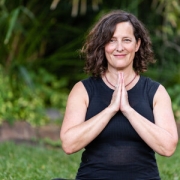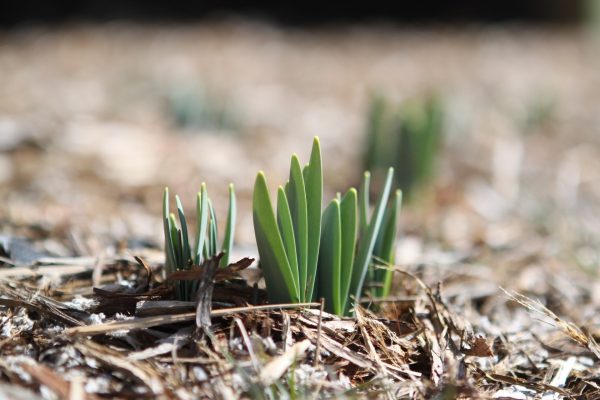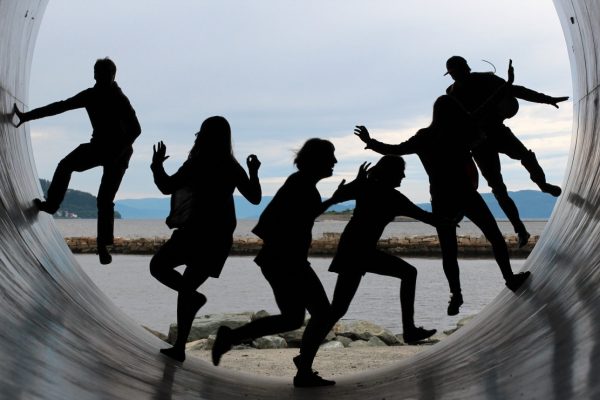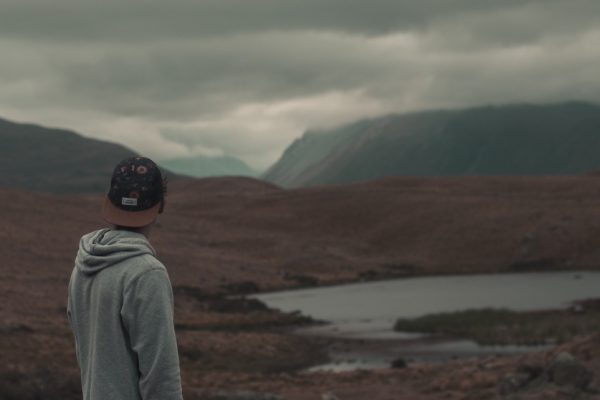Transcription: Welcome everyone, this is Julie Emden of Embodied Jewish Learning. In today’s podcast, I’ll offer an embodied practice of “mechila,” or “forgiveness.” If anything I offer is not right for your body, please do what is right for you.
Pause the recording now, and get a yoga mat and a chair. Place the chair with the two front legs at the end of the mat facing you. Sit forward at the front of the chair, and place your knees as wide as your hips, feet on the mat. Allow the spine to lengthen with ease, from the lower body to the crown of your head. Receive a deep, long breath into the lungs evenly, and feel your spine lengthen up toward the sky. Now, notice where there is tension or tightness in the body, and take a moment to soften somewhere, maybe in the jaw. Softening the armored places in our bodies is one of the simplest ways to experience mechila.
These places can be likened to precious stones. The Hebrew word for topaz, pitdah, one of the hardest stones in Aaron’s priestly chestplate, has the same numerical value as the root of another Hebrew word for forgiveness, slicha. Like topaz, although places in the body and heart may feel hardened, there are fracture points, or potential openings, where the bonds of hardening can be softened.
So, take a moment to come to standing. Turn around and face your chair. Step your right foot forward, just under the front legs of the chair, and step your left leg back in slight external rotation, feet hipswidth apart. Keep the back legs steady, a line of energy lifting from the inner arch of the foot, to the inner knee, inner thigh, up through the pelvic bowl, and the whole spine and the crown of your head. From the strength and alignment of the back leg, raise the arms up, over head, by your ears, palms facing in, keep lifting up and turn your torso toward the front leg. With your right arm lifted, release your left arm to the chair, as you hinge your torso and pelvis over the front leg, and a forward bend-twist for the Revolved Triangle. Feel your alignment and strong legs as an expression of your inner dignity.
Now, bring in the softening quality of mechila again. Soft belly turns you, back body receives the front body in softness. To come out of the pose, lift your top arm and torso up to the sky, and turn to face forward once again. Bring your left foot forward to meet your right, and stand upright for a few breaths. Forgiveness is about letting go, releasing,and softenging, as we maintain the alignment, length and strength of our inner dignity.
Now, step your right leg back, and repeat the pose with the left leg forward. With your back leg turned slightly out, access the long line of energy from inner arch of your back foot, to inner knee, to inner thigh and up through the torso, to the crown of your head, as you raise both arms by your ears. Hinge the upper body and pelvis up and over the front leg, into Revolved Triangle.
Turn your torso to the left from a soft belly, and let the left arm lengthen up to the sky, reaching both arms as one long channel of chiyut, “life force,” as the right hand comes down to meet the chair. Once more, explore the qualities of softness and alignment in the posture. When you’re ready, inhale and lift the top arm and torso to come out. Forgiveness is a practice that is first and foremost for ourselves, where we can release and free our own hearts.
As we close this short practice, stand with your feet grounded, your inner legs strong, spine long, collarbones wide, heart and chest softly open and lifted, and your back body spacious and wide. Feel into the qualities of the topaz, pitdah, as you soften tight places in the body as you turn inward to fully experience and honor all that you feel as a beautiful gemstone, and as you rest into the dignity, harmony, and alignment of your own being.
Thank you for joining me in this brief practice, I wish you a continued exploration of embodied mechila, as you move through your day.
 Julie Emden, Halprin Practitioner, and founding director of Embodied Jewish Learning, infuses her work with exploration, spirit and joy. Julie is passionate about awakening the body as a gateway to deep inner knowing and guides others in somatic explorations of Jewish wisdom teachings as a resource for living in balance and wholeness. A graduate of five fellowship and teaching certification programs related to her work as a Jewish educator, Iyengar-based yoga instructor and movement/expressive artist, Julie has two decades of experience guiding others in exploring Jewish wisdom, text and practices via the body in a variety of settings.
Julie Emden, Halprin Practitioner, and founding director of Embodied Jewish Learning, infuses her work with exploration, spirit and joy. Julie is passionate about awakening the body as a gateway to deep inner knowing and guides others in somatic explorations of Jewish wisdom teachings as a resource for living in balance and wholeness. A graduate of five fellowship and teaching certification programs related to her work as a Jewish educator, Iyengar-based yoga instructor and movement/expressive artist, Julie has two decades of experience guiding others in exploring Jewish wisdom, text and practices via the body in a variety of settings.
Embodied Jewish Learning (EJL) has newly launched a global network for leaders and guides of Embodied Jewish Wisdom for advanced learning, connection and inspiration. Check it out here! EJL offers podcasts, webinars, workshops, retreats, teacher trainings, and individual coaching. EJL also created in partnership with the Peninsula JCC, Shalem: A Jewish Wellness Initiative, which is now collaborative partnership with the Addison-Penzak JCC and the Oshman Family JCC of the San Francisco Bay Area to promote wellness and well-being infused with Jewish wisdom, especially during these times. Julie also served most recently on faculty with the Institute for Jewish Spirituality’s Educating for a Jewish Spiritual Life project to bring mindfulness and embodied practices to Jewish day schools and camps, and is thrilled to support the Harvesting Resilience Project!











